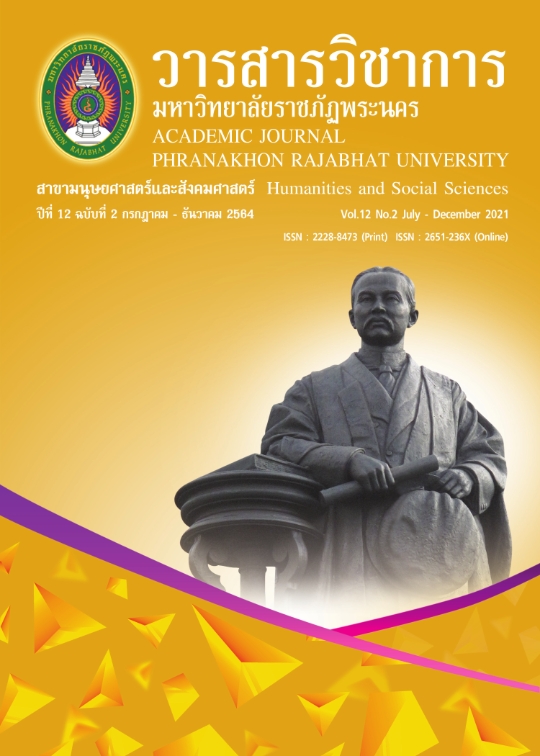THE PATH ANALYSISOF NEWS PERCEPTION, KNOWLEDGE, AND ATTITUDE AFFECTING THE ELECTRICITY ENERGY-SAVING BEHAVIOROF PERSONNELOFPHRANAKHON RAJABHAT UNIVERSITY
Keywords:
Electricity Energy-Saving Behaviour, News Perception,Knowledge, AttitudeAbstract
The objectives of this research were to 1) study the news perception, knowledge, and attitude of personnel, 2) study the electricity energy-saving behavior of personnel, 3) analyze the path of news perception, knowledge, and attitude affecting electricity energy-saving behavior of personnel, and 4) study the guideline for changing electricity energy-saving behavior of personnel. The research was mixed method research. The samples were 300 personnel of PhranakhonRajabhat University. The quantitative data were collected by using the questionnaire. The statistics used to analyze the data were Percentage, Mean (X̄), Standard Deviation (S.D.), and Path Analysis.The key informants were 5 administrators. The qualitative data were collected by using the in-depth interview and content analysis.
The research results were found that the news perception, attitude, and electricity energy-saving behavior was on a high level. The knowledge was on a medium level. The news perception had a direct effect on knowledge (0.13). The news perception had a direct effect on attitude (0.22). The news perception, knowledge, and attitude had a direct effect on electricity energy-saving behavior (0.37), (0.02), and (0.29) respectively. Also, the news perception had an indirect effect on electricity energy-saving behavior (0.07), with predictive coefficient (0.267).The guidelines for changing electricity energy-saving behavior: firstly, there should be paths of news perception, proper knowledge and attitude transmission, motivation and clear policy, and more effective electrical equipment.
References
Bungkerd, S. (2019). Electricity Saving Behavior of Operational Level of Stuff atDumex Limited. Master of Business Administration Program Management Sciences, Silpakorn University. (in Thai)
Chareonrusamee, T. (2017). Electricity Conservation Knowledge and
Awareness Concerning Electricity Conservation of Employees of Hicrete Product and Technology Ltd., Bang Pa-in District, PhraNakhon Si Ayutthaya Province. Master of Science Program in Environmental Education, ValayaAlongkorn Rajabhat University. (in Thai)
Daverport, Thomas H. and Lawrence Prusak, (1998). Working Knowledge :How Organization Manage What They Know. Cambridge, MA :Harvard Business School Prees. (in Thai)
Herry Gleitman. (1981). Psychology. New York: W. Norton Company
Jeepjong, W. (2017). Guidelines for Participation of Personnel in Electricity Energy Saving, Phuket Rajabhat University. Master of Public Administration Program in Public Administration, Phuket Rajabhat University. (in Thai)
Johnson, L.J., & LaMontagne, M.J. (1993). Research methods using content analysis to examine the verbal or written communication of stakeholders within early intervention, Journal of Early Intervention, 17(1) : 73-79.
Kananan, J. (2012). Psycho Social Factors Related on Electrical Energy
Saving Behavior of Civil Servants in Officers of the Ministry of Education, Thailand. Master of Science Program in Applied Behavioral Science Research, Srinakharinwirot University. (in Thai)
Ktawanit, T. (2003). General Psychology. Bangkok: SE-Education. (in Thai)
Kuaprom, S. (2019). The Study of Electricity Energy Saving of Muban Chombueng Rajabhat University. Master of Engineering Program, Siam University. (in Thai)
Limwananon, S. (2016). Factors Affecting Energy Saving Behaviors in the Office of Leopard Medical Brand Company Limited Officers. Master of Business Administration Program Management Sciences, Silpakorn University. (in Thai)
Longman Group. (1998). “Behavior,” in Longman Language Activetor. Barcelona :Carfosa Nunnally, J. C. (1978) Psychometric theory. New York :McGraw-Hill Book.
Pintawong, N. (2016). Readiness of students to influence the concept of the ASEAN community of students. Case Study, Thammasat University, Lampang Center. Master of Social Work Administration and Social Welfare Policy Thammasat University. (in Thai)
Promsri, S. (2015). Study of factors affecting energy conservation inelectronic companies. Master of Arts Social Sciences for Development SisaketRajabhat University. (in Thai)
Sangsanga, W. (2018). Factors of Communication Related to Electricity Energy Saving Behavior of Provincial Electricity Authority (Headquarters) Employees. Master of Arts Program (Mass Communication), Ramkhamhaeng University. (in Thai)
Schermerhorn, J. R., Jr.; Hunt, J. G. & Osborn, R. N. (2000). Organizational Behavior. U.S.A.: Fairford, GLO, United Kingdom.
Schiffman & Kanuk. (2006). Consumer behavior. 8th edition. Upper Saddle River. N.J. :Pearson Prentice Hall.
Serirat, S. (2009). Modern market management. Year 2009 revision. Bangkok: Thammasarn. (in Thai)
Smith, R. E.: Smoll, F. L.: and Hunt, E. B. (1977) Training manual for the coaching behavior assessment system. JSAS Cacalog of Selected Documents in Psychology.
Teddlie, C. and Tashakkori, A. (2009) Foundations of Mixed Methods Research: Integrating Quantitative and Qualitative Approaches in the Social and Behavioral Sciences. Sage, London. Thanatha Amnuay wattanakul, Saowapee Chongcharoen and Worawit Chansuwan.
(2018). Management of participation in electricity saving of undergraduate students, Faculty of Science and Technology, Rajamangala University of Technology PhraNakhon Research work. Bangkok: Rajamangala University of Technology PhraNakhon. (in Thai)
Theerawongkul, W. (1997). Knowledge and Behavior of Energy Saving in Housing of People in Lampang Municipality. Chiang Mai: Chiang Mai University. (in Thai)
Wongsirinopkun, N. (2016). The Social Construction of Meanings and Building Motivation Strategies in Energy Conservation from Supervisors at Food Processing Factory in Ratchaburi Province. Master of Business Administration Program Management Sciences, Silpakorn University. (in Thai)
Yamane. (1967). Taro Statistic :An Introductory Analysis. New York: Harper
Downloads
Published
How to Cite
Issue
Section
License
"บทความวิชาการในวารสารฉบับนี้ ถือเป็นความรับผิดชอบของผู้เขียนเท่านั้น"
สงวนลิขสิทธิ์ตามพระราชบัญญัติลิขสิทธิ์




